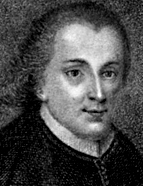

Widely regarded as one of the most distinguished Portuguese jurists of the late 18th century, Pascoal de Melo Freire is often recognised in historical and legal literature as the founder of modern Portuguese legal history. Following his death in Lisbon on 24 September 1798, Garção Stockler, the secretary of the Academia das Ciências [Academy of Sciences], delivered a eulogy for his fellow member, portraying him as an intellectual "divided between the humanities and social duties" (Stockler, Elogio histórico [Historical Eulogy], 1799, p. 29).
Pascoal José de Melo Freire dos Reis was born in the town of Ansião on 6 April 1738, to a humble family. The son of Belchior dos Reis, a military veteran of the War of the Spanish Succession (1701-1714), and Faustina Freire de Melo, he claimed descent from the chronicler João de Barros (Historiae..., 1815 [1788], cap. VIII, § LXXXV, p. 77). His father encouraged him to pursue a career in law at an early age, recognising his aptitude for the study of the humanities. In 1750, at just 12 years old, he was sent to Coimbra to live with his brother Luís de Melo, a Canon of the Cathedral, to begin his university education (Stockler, op. cit., pp. 5-6). Melo Freire's academic performance was exemplary at every stage. He first attended the Instituta course and, having obtained a certificate in Latin, enrolled at the Faculdade de Cânones [School of Canons] in 1751. In 1756, during the formal presentation for final approval to obtain his bachelor's degree, he received unanimous approval nemine discrepante. He continued his studies until 1757, when, at the age of 19, he completed his Ph.D. in Law (C. H. Pereira, "O percurso..." [The Path...], 2016, pp. 74-75).
Pascoal José de Melo began his teaching career as a substitute professor for various courses before joining the Colégio das Ordens Militares [College of Military Orders] (Stockler, op. cit., p. 7). In 1765, he applied for the Professorship of the Vespers course at the School of Law Despite the support of the rector Gaspar de Saldanha e Albuquerque, he was unsuccessful due to the seniority criterion, which worked against him (M. J. Almeida Costa, "Melo Freire...", 1985, p. 250). Melo Freire benefitted from Pombal's reformist zeal (J. Esteves Pereira, "Melo Freire...", 1991, col. 783). One of the many innovations brought by the publication of the new Estatutos da Universidade [University Statutes] (1772) was the creation of a course on National Law, for which Melo Freire was appointed substitute lecturer with privileges equivalent to a regent. He became a professor in 1781 and retired in 1790 (Stockler, op. cit., pp. 24 and 27), a year before being elected a full member of the Academia Real das Ciências de Lisboa [Lisbon Royal Academy of Sciences], having been affiliated as a supernumerary member since 1780 (J. A. Silva, A Academia [The Academy]…, 2018, p. 133). In addition to his academic activities, Melo Freire held several prestigious roles: he served as a deputy of the Council of the Crusading Bull and the Assembly of the Order of Malta (1783), provisor of the Grand Priory of Crato and deputy of its Priory Board (1785), judge of appeals at the Casa da Suplicação [Court of Appeals] (1785), deputy of the Casa do Infantado [House of the Infantado] (1786), of the Mesa da Comissão Geral sobre o Exame e Censura dos Livros [Board of the General Commission on the Review and Censorship of Books] (1787), and of the Conselho Geral do Santo Ofício [General Council of the Holy Office] (1793). He was also honoured as a royal councillor (1793) and received doctoral canonries from the Cathedrals of Guarda, Faro, and Braga (Inocêncio, “Paschoal…”, 1862, p. 350; Stockler, op. cit., p. 27-30).
This work is financed by national funds through FCT - Foundation for Science and Technology, I.P, in the scope of the projects UIDB/04311/2020 and UIDP/04311/2020.
